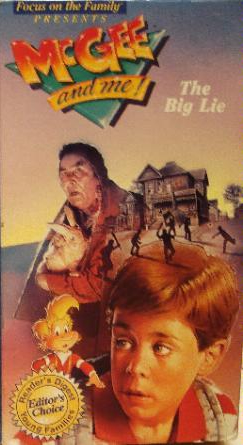‘McGee and Me’: The Biggest Lie
Church kids: do you remember what it was like to suspect that something you did would turn out to be a sin that God hated all along without you knowing it?
I remember. That was before I learned of this good news:
- If: God is neither an idiot, nor is He cruel. He is in fact fully capable, and He is love.
- Then: He would capably, lovingly communicate to us exactly what counts as sin
Of course then I was led to consider that this is also bad news. In fact, it’s much worse than having a loophole to plead ignorance of the Law that He reveals in Scripture. Thank God that because of Christ’s life and atoning death and resurrection, it’s His sacrifice for sin that pays my debt and His righteousness that covers me and powers my own righteousness.
Alas that this greatest Story of Scripture is missing in some Christian children’s stories.
At Christ and Pop Culture yesterday, Dr. Alan Noble explores one 1980s evangelical series that is very familiar to former church kids of all decades hence.
Watching McGee and Me as a kid did not turn me into a legalist, but it did help shape my vision of what it meant to love God and seek forgiveness.
As Noble says: this understanding was not that good. The rest of the piece explains why.1
Suspended injustice
If you’re like me and watched this video series, you especially enjoyed the animated bits featuring McGee, who plays a goofier Jiminy Cricket to regular-kid protagonist Nicholas.
McGee breaks a window unintentionally because some city planner thought it was a good idea to put a baseball diamond across the street from a glass shop. The authorities swoop down with swift and absurdly disproportionate justice to drag a small boy off to prison. Since the story ends so abruptly there’s no trial and no chance for McGee to admit to his lie, so in the world of the parable McGee must spend eternity with the guilt of his crime. The injustice is suspended indefinitely with no hope for redemption.
That’s the animated segment. Noble describes more of the live-action tale in which Nicholas talks with his father about how to undo the consequences of a rumor Nicholas has spread.
The “biblical” lesson is that no matter how trivial a lie might be, once spoken, it begins a web of destruction and evil, consuming innocent people, cutting us off from God, and making an already-crucified Christ cry. Oh, wretched man that Nick is! Who or what will rescue him from this body of death? What can he do?
The only answer given: “What do you think?”
Missing grace?
Some parents are much like Nicholas’s well-meaning father. They think they can simply ask, “What do you think?” and then leave.
Or they might give their children a Christian children’s product that tries to teach morals.
But that results in another big lie: a lie by omission of the Cross.
As terrible as this show was for me as a kid, it did get the consequences of sin right. Sin is unimaginably destructive. We are all blackout drunks who’ve no way of knowing what great tragedy we have caused. We are inescapably weighty in our existence. But that’s only half of the story. Not even half.
Reading this, I wonder two questions.
First, doesn’t this strong-sounding objection — Product X “lies” by omitting the Cross — actually deny the fact that Christian art need not show/tell the whole Gospel every time?
On Facebook that was author Adam Graham’s challenge about Noble’s column, and I understand where he’s coming from! One response:
A rallying cry for Christian storytelling is that you don’t need to include the full John 3:16-Gospel in every representation of sin and its consequences. Not every book of Scripture itself does that. You can have a story/book that is part of the revealed Word of God (such as Ecclesiastes) that might confuse the heck out of us, but still fits into the narrative.
But with this there’s a difference. Creators, know thy audiences. The audience is Christian and evangelical kids, not those outside the Gospel. The audience is, presumably, folks who exist within the covering of Christ’s salvation. In that case, if the story is about sin and consequences, you need to emphasize grace more. But if in fact the audience was nonbelievers, then you need to emphasize sin more!
I agree with Alan’s contention that this particular episode fell uncomfortably into that middle ground. The story did say, “Your sins aren’t that big a deal, in fact they may be closer to simple accidents, but OH LOOK AT THE PAIN THEY CAUSE.” All the consequences of total depravity (Biblical) but with little emphasis on man’s actual willful sinful nature (American “gospel”) = cognitive dissonance.2
Second: given the chance, would the makers of “McGee and Me!” in retrospect ask similar questions about their own stories? I am certain that occurs to all of us long after the thing is in its eleventh printing or filmed and locked on VHS. Sure, it’s far easier to look back at a story with 20 years’ hindsight than it was to try making the story in the first place.
Christian behavior without Christianity?
 But specifically about the “morals over the Gospel” question, at least one Christian children’s storyteller, VeggieTales creator Phil Vischer, has been blessedly direct about how he regrets moralistic emphasis in those stories.
But specifically about the “morals over the Gospel” question, at least one Christian children’s storyteller, VeggieTales creator Phil Vischer, has been blessedly direct about how he regrets moralistic emphasis in those stories.
After the bankruptcy [of Big Idea Productions in 2003] I had kind of a forced sabbatical of three or four months of spending time with God and listening to Him. I looked back at the previous 10 years and realized I had spent 10 years trying to convince kids to behave Christianly without actually teaching them Christianity. And that was a pretty serious conviction. You can say, “Hey kids, be more forgiving because the Bible says so,” or “Hey kids, be more kind because the Bible says so!” But that isn’t Christianity, it’s morality.
[…] And that was such a huge shift for me from the American Christian ideal. We’re drinking a cocktail that’s a mix of the Protestant work ethic, the American dream, and the gospel. And we’ve intertwined them so completely that we can’t tell them apart anymore. Our gospel has become a gospel of following your dreams and being good so God will make all your dreams come true. It’s the Oprah god. So I had to peel that apart.3
What evangelical children’s stories have you needed to peel apart? How have you done it?
- This is a free preview of Christ and Pop Culture Magazine. Monthly subscriptions are $2.99; yearly subscriptions, $29.99. ↩
- From me on Facebook. ↩
- “It’s not about the dream,” Sept. 24, 2011, Megan Basham, World. ↩









































Having watched/been traumatized by that first McGee episode, I object the the guy saying the “What do you think?” Line was the only answer. The dad asks the question, then Nick is shown repairing the damage and cleaning up the mess. Yes, he lied, but he atoned for it afterward and presumably asked the old man for forgiveness. As a kid, I understood it fine–my big hang up was figuring out just when Nick lied in the first place!
Veggietales morality always bugged me without my knowing why, so I’m glad it’s been articulated. I especially dislike their Bible story retellings, because they tend to strip away the dignity of the original people. Their original stories are much better. (Larry Boy all the way!)
As a parent, it is hard to balance teaching my kids to do what is right and grace. It is so much easier to change the behavior, but never reach the heart. On the other hand, I can give so much grace that they take it for granted and never learn how serious sin is.
I don’t think any book or video series or parent gets it right all the time. We will either swing to one side or the other. Sure, McGee and Me might have swung too far on this episode, but that doesn’t mean it’s not a good series for kids. Same with Veggietales. It is a tool, but one that needs to be coupled with parents, parents who are teaching the gospel, grace, and sin.
So: “Part of this complete breakfast”?
God+parents+tools+whatever life brings you that you can use to teach your kids about God. In the end, it has to be God who unlocks the heart. Even we cannot unlock our own sinful heart. What I can do as a parent is continue to share who God is, give grace, teach morals, and say “I’m sorry” and “Will you forgive me” when I mess up. I think our humility can be the biggest thing that points our kids to God.
As far as books or video series, I’ll use them if I think they help me teach my kids. Right now I am reading the Action Bible to my kids. They love it! It speaks to them on a level they understand. And I am reading it with them so I can teach them along the way. I even caught my daughter reading the book beside her night light last night. So far, I am impressed with the book 🙂
I can’t really point fingers too hard at VeggieTales, because I doubt they would have been as popular if they had gone into things that denominations fight over. Even this site tends to avoid the more controversial stuff like the portrayal of women or brown people or QUILTBAG people. But I guess I can do that on my own blog, now that I have one.
Interesting abstract. To whose portrayal(s) do you refer, exactly, of women, “brown people” (we are all one people, especially in Christ!)? (I don’t even know what “QUILTBAG” means.) As it is, this is purely a consideration of audience. If SpecFaith writers harped on issues of racism or hate against particular groups, and even managed to tie this to our perennial theme of exploring epic stories for God’s glory, this would only be preaching to the choir. After all, we know of no racists or haters among our audience. There’s also a certain risk of sacrificing creativity for the sake of “preaching” against pet social causes — be they abortion or enabling government power on the “right,” or any other issue on the “left.”
(QUILTBAG is the easiest super-inclusive term for gay people: Queer, Unidentified, Intersex, Lesbian, Trans*, Bisexual, Asexual, and Gay.)
But the thing is, I can’t think off the top of my head of any brown-people characters in Christian fiction who aren’t cameos or some kind of benighted native to be administered to.
Amish fiction is obviously white as heck and limited in range for women, and there’s not really much to be done about that. But that Amazing Grace movie, though about slavery, was all about the white dude, which isn’t bad in of itself, except that we rarely, if ever, hear from black perspectives. Or those prairie stories that talk about the white people and (if brown people are mentioned at all) their reaction to Native Americans, and just don’t talk about the Native Americans and those white people who keep getting all up in their grills.
I once read an account of Quaker missionaries who ministered to the Kiowa in Oklahoma. The Kiowa were mostly cooperative, but I can’t help but feel the tragic element in that “Christianizing” them meant making them act like white people in everything, clothing, language, etc. Sure, it was to their benefit to learn how to manage in white-people culture, but they would cut boys’ long hair pretty much just because white people culture dictated short hair. It would make for an interesting exploration for doing something out of religious and good motivations but ending up doing something cruel because of it.
I suggest a caution. You may fall into one of a couple traps here:
Let’s be on the lookout for actual racism, says I. But let’s discern based on what we can tell — which is very little — are the motives of the heart, and not the outward appearance. Only God can look on the heart (1 Sam. 16:7). And as a Christian I am forbidden to judge based on external-only laws that I’ve made up. In this case we may buy into “laws” made up by others with no regard for God’s actual moral standards. Such folks are often eager to grab their own religious “secular” power, in the name of “morality” or advocating social justice.
I wouldn’t say they do it without penalty, though angry bloggers probably aren’t enough to really make a difference to the Machine of Hollywood.
(And of all my commentary on this site, I’m kinda surprised it’s this one that gets thumbs down. I’d figure that by this point that everybody knows that minorities still tend to get the short end of the stick.)
Pat Todoroff’s Eshu International series has the triplets, three genetically engineered albino African soldiers, and his current work is set in Africa of the future. His C1arity Wars had someone who was Farsi or spoke it, I think. His Christian characters in it are Spanish, I think.
He’s an awesome author, and I wish he would get more love. He writes some great cyberpunk in a Bruce Sterling style.
Awesomesauce
To an extent, minority representation in fiction by the majority is a catch-22. Write about a minority population, especially one with a distinct culture, and people will accuse you of cultural appropriation. Don’t write about minorities, or emphasis similarities instead of differences, and people will accuse you of whitewashing.
This is a topic close to my heart because I’ve chosen not to write explicitly Christian kid’s fiction. The problem I have with it is that in trying to talk about the Cross, we can’t help but simplify it dramatically into a kid-friendly format. I think instead, we really do have to teach kids morality, empathy, and imagination and then when they reach an age where they can understand the cross, they’ll be in good shape to accept it.
Otherwise it can be dangerous. Like with sin and the idea that nothing we can do is good enough to please God, so we need grace. A kid can get the “nothing I do is good enough” if simplified or moralized in the wrong way. I think an older kid or adult realizes that we can’t be good enough, but we also aren’t to internalize this as reflecting on our worth to others or behavior. Or like holiness and sanctification; it’s hard to explain the point that the Holy Spirit also works in us to make us more like him, and the kid thinks its all about works. Kids lit isn’t always sophisticated enough to present this kind of message.
If you want to teach children the cross, you need to teach it. Kid’s art and fiction can never be didactic enough to do so without suffering or simplifying to a large extent. It’s enough to be moral; let the parents and the local church instruct.
I believe that is the most information and facts in my opinion. And i am glad examining your own document. Even so should remark in a few typical difficulties, The site flavour is perfect, your content articles is absolutely excellent : Deb. Outstanding process, best wishes